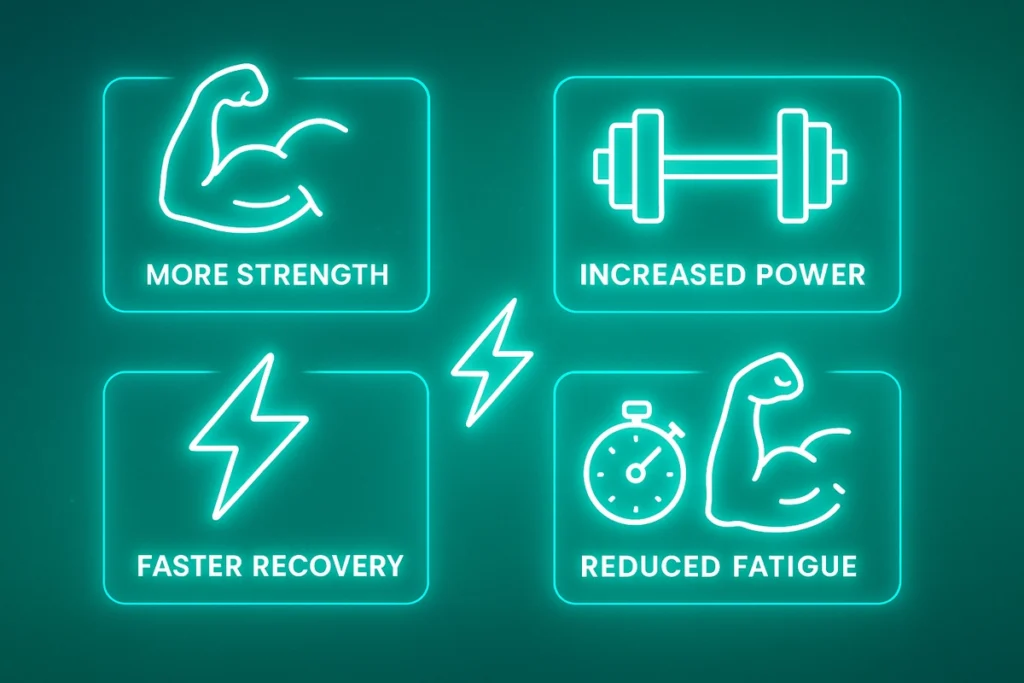Want to lift heavier and smash strength plateaus?
One proven supplement can help — creatine monohydrate.
Backed by science and trusted by pros, it boosts power, speeds up recovery, and fuels serious performance.
Whether you’re new to lifting or chasing PRs, creatine helps you train harder without breaking the bank.
But it only works if you use it right.
In this article, I’ll break down its real benefits, share client results, and show you how to get the most out of creatine — starting today.
Table of contents
- Quick Answer: Does Creatine Really Boost Strength?
- How Creatine Monohydrate Works in Your Muscles
- Top 5 Strength Benefits Backed by Research
- Real-World Results: What I See in My Clients
- How to Use Creatine for Maximum Strength Gains
- Is Creatine Safe for Long-Term Use?
- Is Creatine Good for Women Who Lift?
- Final Take: Should You Add Creatine to Your Strength Program?
Quick Answer: Does Creatine Really Boost Strength?

Yes — creatine monohydrate is one of the most effective and science-backed supplements for strength training.
It works by increasing your body’s ATP production, which helps you push harder during high-intensity lifts like squats, deadlifts, or sprints.
I’ve used it myself for over six years — and I’ve watched dozens of clients gain real strength and endurance by simply adding creatine to their routine.
If you’re training for power, performance, or muscle — creatine should be in your stack.
How Creatine Monohydrate Works in Your Muscles

Your muscles run on ATP, the fuel for short bursts of effort.
Creatine boosts your phosphocreatine stores, which lets your body regenerate ATP faster during workouts.
That means you can lift heavier, push more reps, and recover faster between sets.
This isn’t just gym bro talk. The science is rock solid.
If you’re curious about the biological mechanisms, check out this breakdown:
👉 Creatine Before or After Workout – What’s Better?
👉 Best Time to Take Creatine for Muscle Growth
Top 5 Strength Benefits Backed by Research

Here’s what you can realistically expect when you supplement with creatine:
- More strength in compound lifts like squat, bench, and deadlift
- Increased explosive power for sprints, jumps, or Olympic lifts
- Faster recovery between heavy sets
- Lean muscle growth from higher training volume
- Reduced fatigue during high-intensity sessions
Want to learn how to get even more from creatine? Start here:
👉 Creatine Loading Phase Workout Benefits
👉 Creatine vs Beta-Alanine – Which Is Better for Strength?
Real-World Results: What I See in My Clients

These aren’t just textbook benefits — I’ve seen them in action.
Luca, a 32-year-old from Italy, had plateaued at a 90 kg bench press.
After adding creatine to his routine, he hit 100 kg in just over a month.
Reza, one of my Iranian clients, needed to boost his performance.
In 4 weeks, his weighted pull-ups jumped from 3 to 7, and his sprint time improved significantly.
As for me? Creatine helped me push past a long-time deadlift plateau, adding 10 kg within weeks — and improving my leg-day recovery dramatically.
How to Use Creatine for Maximum Strength Gains

You don’t need to complicate it.
- Daily Dose: 3–5g of creatine monohydrate
- Timing: Post-workout with carbs + protein is ideal
- Loading Phase? Optional — I don’t usually recommend it
Some lifters prefer to load creatine for faster saturation.
If that’s you, learn the safe way to do it here:
👉 Creatine Loading Phase Explained
👉 Creatine Loading: 5 or 7 Days?
From experience, I skip loading with most clients unless they want fast results.
It minimizes bloating and works just as well long-term.
Speaking of side effects — a client of mine, Emma (26, UK), experienced bloating at first.
We dropped her dose to 3g per day and made sure she stayed hydrated. Problem solved.
Is Creatine Safe for Long-Term Use?

One of the most common questions I get is: “Is creatine bad for your kidneys?”
The truth is — creatine is very safe when used properly.
Dozens of studies confirm that long-term use does not harm healthy kidneys or liver function.
I’ve personally used it for years and seen zero health issues in myself or my clients.
If you still have doubts, read this in-depth guide:
👉 Is Creatine Safe for Kidneys?
Is Creatine Good for Women Who Lift?

Absolutely. Women benefit from creatine just as much as men, especially for strength, body composition, and recovery.
I’ve worked with female clients who not only got stronger but also felt more energized during their workouts after adding it.
If you’re a woman looking to lose fat, preserve muscle, and improve performance — creatine can help.
👉 Creatine for Women & Weight Loss – Full Guide
Final Take: Should You Add Creatine to Your Strength Program?

If you’re serious about strength, creatine is one of the smartest additions you can make to your routine.
It’s affordable, safe, research-proven, and delivers real results — both in the lab and in the gym.
Make it part of your daily stack, stay consistent with your training, and get ready to lift heavier, recover faster, and feel stronger.



Leave a Reply